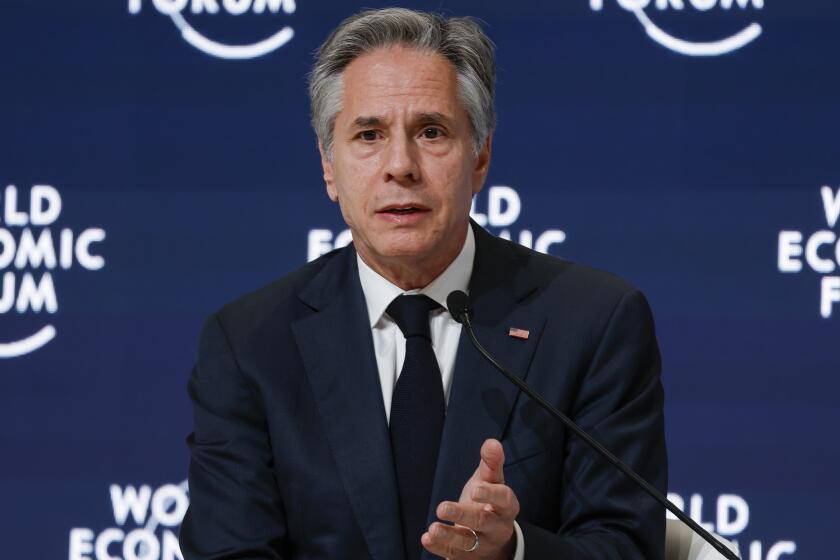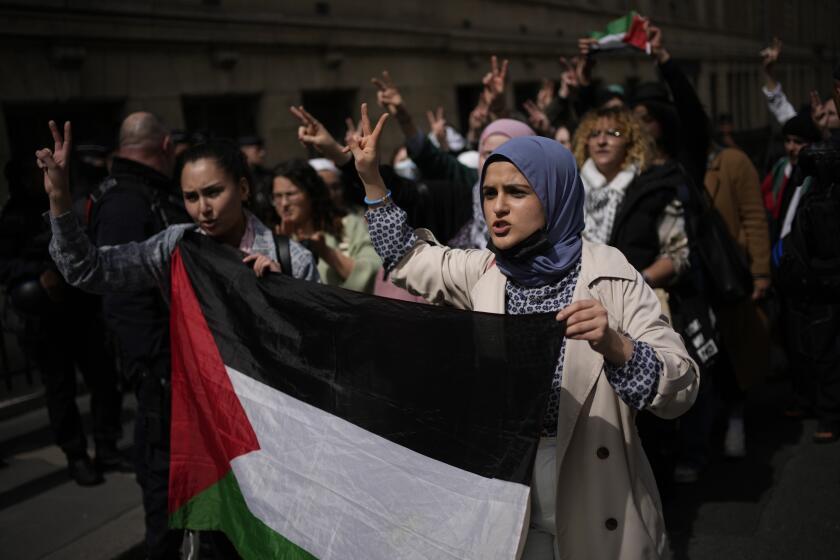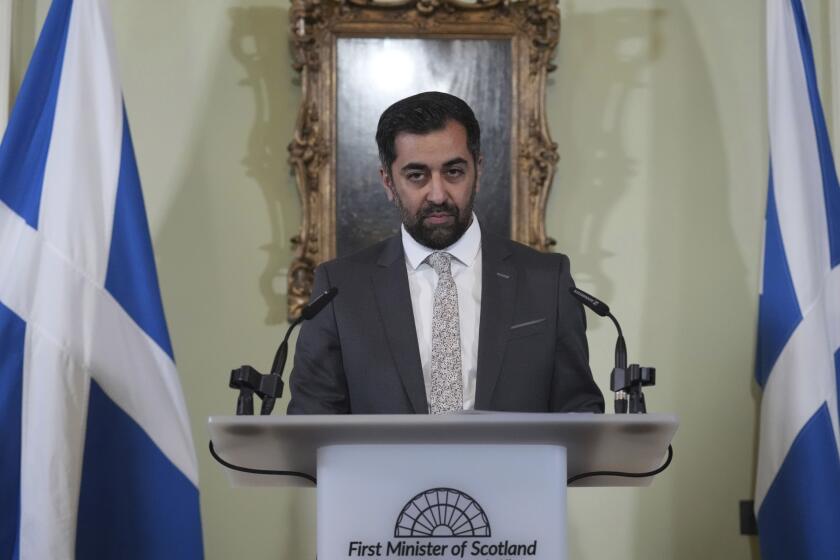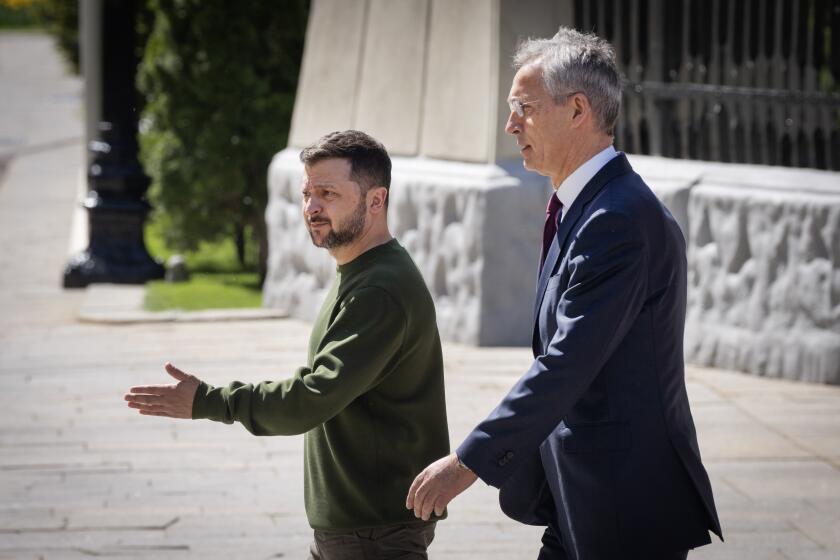Death Squads Target the Iraqi Next Door
On that scorching afternoon last month, Ahmed Kamel was playing soccer with his two children outside his home here when three men drove up in a Chevy Caprice, pulled out their guns and dragged him away.
“You will see your father tomorrow behind the levee,” one advised Kamel’s 13-year-old, Mustafa, as the boy clung desperately to the escaping car.
Four hours later, the family later learned, police found Kamel’s body where the kidnappers said he would be: a notorious dumping ground for the dead in northeast Baghdad. His crime? He had served in the Iraqi army for more than a decade and lived in a neighborhood where Shiite Muslim militias are pushing out Sunnis like him.
Evidence enough in the cold calculation of life and death in this capital of fear. A wrong turn, a detour, an untoward stare, a pointed finger, an anonymous denunciation, a nod of the head -- these can, and do, lead regularly to death.
Sectarian death squads snatch victims off the street or from their cars, from their homes or their offices, from mosques or hospitals. The killers come at night or day. They come in uniforms or civilian garb.
“They say this is God’s will, but this is not God’s will,” said Nisreen Yaseri, mourning the killing last week of her cousin Mohammed Jabbar, 26. “This is people’s will. It’s not about God.”
Jabbar’s mistake? He was a Shiite house painter who was riding in a taxi through a mostly Sunni west Baghdad neighborhood when gunmen at an improvised checkpoint stopped the cab last Monday. He and four co-workers, all Shiite, were taken away.
Their bullet-ridden corpses, trussed and showing signs of torture, were found Tuesday on the streets of the same Adil district where their taxi had been stopped.
Their loved ones next saw them in the morgue of Kadhimiya Hospital.
“Hamoodi,” as Jabbar was known, had taken precautions: He had recently obtained a new identification card, omitting his tribal name -- and thus blurring his sect, at least theoretically. “If they want me to be a Sunni, I’ll be a Duleimi if they like!” Jabbar had told friends, referring to a major Sunni clan, his cousin recalled. “I’ll be a Shia. Anything.”
Others seek to erase their name altogether; newspapers here daily contain legal ads from men seeking to change their given name from Omar, a trademark Sunni name.
“But if they stop you, they ask you questions -- what tribe do you come from? Who is your uncle? It is impossible to escape,” lamented Omar Hirmizi, a shopkeeper in the largely Sunni Adhamiya district who had contemplated the ruse and decided it was no solution.
Some feel a false sense of security. Such apparently was the case with Muatiz Qaisi, a Sunni who was a longtime grocery shop owner in the largely Shiite enclave of Sadr City. He had many Shiite friends and acquaintances and was well liked. Gunmen came for him one day last spring after the bombing of a Shiite shrine in Samarra, the event that sparked the current wave of violence.
He was thrown into the trunk of a sedan, but the kidnappers forgot to take his cellphone.
“I was taken by armed men, and I’m inside the trunk of their car,” he told his relatives in a telephone call, according to a nephew.
Later that evening, the kidnappers used the cellphone to call the nephew, saying they were from the “central crime bureau,” although the nephew had never heard of the agency, and doubted its existence.
“We have information that your uncle used to kill Shia during the time” of Saddam Hussein, the kidnappers told the nephew, according to the nephew’s account.
“When did my uncle have time to kill those people?” the nephew responded. “My uncle had a shop for 15 years that used to be open from 7 in the morning until 8:30 at night.”
The uncle’s body turned up the next morning, along with four others. Bullets had disfigured all five faces in a similar pattern of mutilation.
In the anxious hours after a disappearance, frantic relatives of the missing embark on a now-ritualized hunt: to police stations, government ministries, to shady contacts who may know something.
When men in fatigues arrested Feraz Abbas Kubais, a Sunni electrician, at his home, his cousin placed a telephone call. The cousin knew someone close to the Badr Brigade, a Shiite, Iranian-trained militia that has ties to the Interior Ministry.
“I’ll see what I can do,” the cousin was told, a friend recalled. Two hours later, the Badr man called back. “I’m sorry, it’s too late,” the cousin was told. “You’ll find him in the morgue.”
Some bodies are never found, perhaps tossed in a clandestine grave, or decomposed beyond recognition, or dumped in the Tigris River or an irrigation canal from which they never emerge.
So many corpses were clogging the capital’s main sewer plant last spring that authorities launched an inquiry, with U.S. technical assistance. Investigators discovered a macabre pattern: Manholes from as far as several miles away had been used as disposal sites, allowing the remains to course underground through broad concrete pipes along with the city’s subterranean effluvia.
“It’s possible some bodies were minced by the pumping system, and we never knew about them,” said Ahmed Abdil Elah, assistant general manager of the city sewage system. “There is no trace of them.”
The city battened down the manholes, and the ghoulish torrent ceased.
Other remains are identified only after they have been interred with the anonymous.
Such was the case with Muayid Rahman Batawi, 28, a Sunni living in Al Khatib neighborhood, where Shiites have been displacing Sunnis as the majority.
Batawi was afraid to leave the house on foot, though he occasionally ventured out in his car, his brother recalled. That was his misstep. He disappeared after stopping at a gas station July 3, his brother said. His corpse turned up six days later in the mostly Shiite Shula section of Baghdad.
Morgue officials would not release the body without a letter from the police. By the time the family secured the needed document, it was too late. Batawi’s body had been taken with others of “unknown identity” to the Shiite burial grounds of Najaf, 90 miles south of the capital -- not a place where Sunnis would opt to send their loved ones, especially in these days of mutual enmity.
“We immediately sent our mother, alone, to Najaf to get the body, since we thought it was safer for a woman,” his brother recalled. “But they wouldn’t give her the body.”
Batawi’s corpse remains entombed in the gray earth of Najaf.
At the Wadi al Salam (Valley of Peace) cemetery complex in Najaf last week, gravediggers were gouging holes for 63 more bodies, the latest no-name victims shipped down in a refrigerator truck from the capital.
“I feel a very deep sadness. Those killed are our brothers,” said Mehdi Asadi, who oversees disposal at the so-called Cemetery of the Unidentified, a kind of potter’s field.
Workers paint a number on a stone at each grave of the unknown, a reference should someone wish to claim the remains. Relatives who identify the dead from digital morgue photographs regularly seek to have the bodies disinterred and moved.
For the families left behind, there is little consolation in the discovery of a body, only the quelling of lingering doubt.
Although police found Kamel’s body at the levee just hours after he was spirited away, his family members didn’t discover his fate until last week because his body hadn’t been identified. They finally recognized him in a morgue photograph.
Kamel’s remains had been dispatched for burial as an “unknown” to the Shiite holy city of Karbala.
His Sunni family decided to leave him there in peace. Loved ones plan to make their graveside pilgrimage 40 days after his death, respecting a venerable Muslim custom that transcends Iraq’s sectarian divide.
*
Times staff writers Shamil Aziz, Suhail Ahmad, Raheem Salman, Zainab Hussein, Mohammed Arrawi and Saif Rasheed in Baghdad and special correspondent Saad Fakhrildeen in Najaf contributed to this report.
More to Read
Start your day right
Sign up for Essential California for news, features and recommendations from the L.A. Times and beyond in your inbox six days a week.
You may occasionally receive promotional content from the Los Angeles Times.






